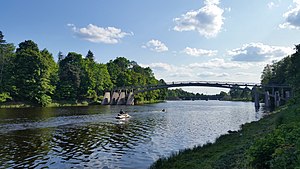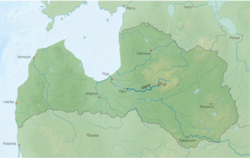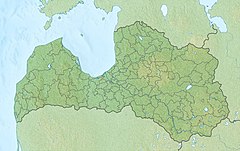River in Latvia
.mw-parser-output .hidden-begin{box-sizing:border-box;width:100%;padding:5px;border:none;font-size:95%}.mw-parser-output .hidden-title{font-weight:bold;line-height:1.6;text-align:left}.mw-parser-output .hidden-content{text-align:left}@media all and (max-width:500px){.mw-parser-output .hidden-begin{width:auto!important;clear:none!important;float:none!important))You can help expand this article with text translated from
the corresponding article in Latvian. (December 2009) Click [show] for important translation instructions.
View a machine-translated version of the Latvian article.
Machine translation, like
DeepL or
Google Translate, is a useful starting point for translations, but translators must revise errors as necessary and confirm that the translation is accurate, rather than simply copy-pasting machine-translated text into the English Wikipedia.
Do not translate text that appears unreliable or low-quality. If possible, verify the text with references provided in the foreign-language article.
You must provide
copyright attribution in the
edit summary accompanying your translation by providing an
interlanguage link to the source of your translation. A model attribution edit summary is Content in this edit is translated from the existing Latvian Wikipedia article at [[:lv:Ogre (upe)]]; see its history for attribution.
You should also add the template ((Translated|lv|Ogre (upe))) to the
talk page.
For more guidance, see
Wikipedia:Translation.
The Ogre is a river in Latvia. The 188 kilometers long Orge is a right tributary of the river Daugava. In the 13th century, the Ogre was called Wogen or Woga.
Etymology
There are three main versions of the etymology of Ogre's name (both town and river). According to the first, the name of the river from which this city derives its name is of Russian origin (угри, ugri, meaning "eels") because there used to be many eels in the river Ogre. A popular folk legend says that Catherine the Great of Russia was the one who gave the river this name because there were a lot of eels in the river;[1] however, this lacks any evidence.
Whereas Estonian linguist Paul Alvre takes into consideration an older form of the Ogre river's name (Wogene, Woga) first found in Livonian Chronicle of Henry (1180–1227), and argues that it cognates with Estonian word voog (with possible meanings: "stream, flow, waves"), therefore showing connection with Finno-Ugric languages, most probably early Livonian language.
A third etymology gives a reconstructed form *Vingrē, related to Lithuanian vingrùs, "meandering, curly" or Latvian vingrs, "nimble;" thus meaning "the meandering river"; the village of Engure has the same root.[2]


